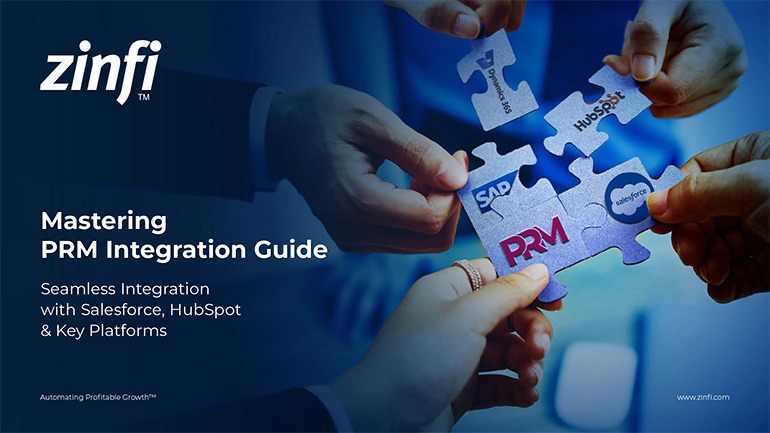Best Practices Articles

Five Mistakes to Avoid in Channel Marketing
If you think marketing is hard, try channel marketing! Seriously: How do you align a group of companies that do not work for you to spread your message consistently across the globe and generate demand for your products and services quarter after quarter? Well, hope and prayers are certainly not the answer. Neither is randomness, which tends be the approach a lot of companies take when trying to sell through the channel.
In this article, we will briefly explore effective ways to run channel marketing programs, with a focus on common traps and how to avoid them.- They don’t wake up thinking about you. One of the biggest mistakes channel marketers make is assuming they have some level of influence or control over their partner base. The reality is they don’t. Partners are independent business organizations, focused around driving value for their customers, employees and investors. No matter how dependent they may be on a vendor’s product or solution, at the end of the day they exist because of their own customers.It is incredibly important for a channel marketing team to understand this and figure out which channel marketing campaigns and programs fit an individual partners’ business goals and objectives, and not the other way around.Keep in mind the average partner is being approached by a dozen vendors, if not more; the partner might also be a captive franchise obligated to push a specific product or solution. Vendors that fail to understand the core objectives of each partner organization can easily misfire and end up annoying the partner base by pushing the wrong channel marketing programs on the wrong partners.
- Show me the money. No matter how excited you are about the product or program you are rolling out as a channel marketer, for a partner to get excited you must show how your new channel marketing initiative—or any existing one—can make more money for the partner.We see a lot of vendors pushing programs and campaigns that are great end-user-facing campaigns, but the vendors neglect to articulate how those campaigns will make partners more money. These vendors completely miss the point. Assuming it is a profit-driven organization, the partner is in the business of making money. Period. Every channel marketing team needs to constantly remind itself of this basic principle and embrace the profit-making motive of partners. When the vendor team can clearly demonstrate how a campaign or program will impact the partner’s bottom line, the probability of success for that specific program increases exponentially.
- Watch out for the KISS of death. In this case, KISS stands for Keep It Super Simple. It’s easy to cite as a rule of thumb, but channel programs can quickly get very complicated due to internal dynamics, legal requirements, the difficulties of satisfying a large group of diverse stakeholders, as well as global and regional differences among partners. Often, what starts out as a simple program grows roots and branches over time, and multiple new requirements are tacked on for a partner to able to participate. The more hurdles you put up, the less likely you will see adoption.Therefore, when you are designing a channel marketing program or campaign, think about whether you are making it easier for a partner to participate. Are you providing support to explain the details of the program? Instead of offering a two-page program sheet or a 10-slide presentation, do you have someone who can succinctly explain to the partner organization how they will benefit from the program and what specific efforts they need make in order to win? If the benefit of a program is not immediately clear to the partner, it will almost certainly be the KISS of death for the vendor.
- What goes around comes around. Good or bad, the channel has a tendency to have a boomerang effect. What I mean is, if you have a channel marketing program that is easy to use and quickly drives partner profitability, then the word gets around rapidly, and before you know it many partners are talking to each other and driving up the adoption of your channel marketing program.The contrary is also true. If you have rolled out a new product or special pricing or a special channel marketing campaign and it is not going well, that news gets around the channel pretty fast, too. In today’s age of social media and connectivity, with many partners simultaneously working together to drive geographic coverage, it is essential to be successful with products and programs and then let the good word spread on its own. If a program or initiative is not working, however, then pull it off the channel fast, cut your losses and move on.
- Better late than never. Very rarely do organizations actually go out and ask their partners where improvements need to be made. While it is quite common to do a customer or employee satisfaction survey, few channel organizations go out and ask for feedback from channel partners using structured surveys that ask partners to name specific areas that need improving.For a channel marketing organization to be truly successful, it needs to solicit feedback on a regular basis about its programs and initiatives. The information gathered should not be confined to qualitative or anecdotal feedback from just a few partners. It should be solicited from a broad spectrum of the channel made up of partners who are actively participating in those programs and initiatives. If you have never sent out such a survey, now is the time to start, and you should repeat the process on a regular basis. It is never too late to start using structured surveys to better understand your partner base and get insights on how to improve.
Best Practices Guidebook
 The Ultimate Guide to Partner Marketing Success Best Practices
The Ultimate Guide to Partner Marketing Success Best PracticesDownload Guide
 How to Start and Scale Partner Ecosystems Best Practices
How to Start and Scale Partner Ecosystems Best PracticesDownload Guide
 The Evolution of PartnerOps: Past, Present & Future Best Practices
The Evolution of PartnerOps: Past, Present & Future Best PracticesDownload Guide
 Mastering Channel Sales: Strategies, Best Practices, and Growth Tactics for 2025
Mastering Channel Sales: Strategies, Best Practices, and Growth Tactics for 2025Download Guide
 Winning with Partner Advisory Councils: Best Practices for Partner Engagement & Growth
Winning with Partner Advisory Councils: Best Practices for Partner Engagement & GrowthDownload Guide
 The Future of Partner Ecosystems Best Practices
The Future of Partner Ecosystems Best PracticesDownload Guide
 The AI Revolution: How Technology and Talent are Shaping the Future
The AI Revolution: How Technology and Talent are Shaping the FutureDownload Guide
 Top 105 Partner Management Metrics that Matter Best Practices
Top 105 Partner Management Metrics that Matter Best PracticesDownload Guide
 Mastering PRM Integration Best Practices
Mastering PRM Integration Best PracticesDownload Guide
 Building a Sales Partner Portal with Salesforce Best Practices
Building a Sales Partner Portal with Salesforce Best PracticesDownload Guide
 Building and Managing Partner Ecosystems Best Practices
Building and Managing Partner Ecosystems Best PracticesDownload Guide
 Mastering Co-Marketing and Co-Selling Best Practices
Mastering Co-Marketing and Co-Selling Best PracticesDownload Guide
 Transforming Partner Ecosystems Best Practices
Transforming Partner Ecosystems Best PracticesDownload Guide
 Mastering Partner Ecosystems Best Practices
Mastering Partner Ecosystems Best PracticesDownload Guide
 Mastering Partner Onboarding Best Practices
Mastering Partner Onboarding Best PracticesDownload Guide
 Partner Ecosystem Management Best Practices
Partner Ecosystem Management Best PracticesDownload Guide
 B2B Marketing in the Age of Intelligence Best Practices
B2B Marketing in the Age of Intelligence Best PracticesDownload Guide
 Multi-Partner Co-Selling Best Practices
Multi-Partner Co-Selling Best PracticesDownload Guide







